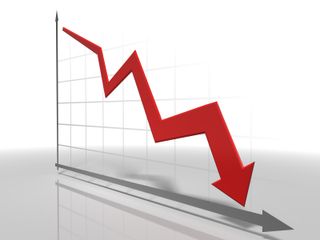Gartner: Mobile phone growth slipping
But market leaders Nokia and Samsung are both well-positioned to handle the turbulent economy, Gartner has said.

Nokia, Samsung and other handset makers have been saying it for weeks, and now it's been confirmed by Gartner: mobile phone sales are on the slide.
While sales in the global mobile market are still up six per cent from last year, the growth rate has slowed considerably from a double digit 16 per cent in the third quarter of 2007.
According to Carolina Milanesi, research director for mobile devices at Gartner, the global economic downturn has "affected sales in both mature and emerging markets during the quarter. Replacement sales in particular were affected, while first time users continued to see the value of acquiring a mobile phone."
Earlier this month, Nokia warned the market was shrinking. According to Gartner, that firm still tops the sales ranking, selling 118 million phones in the third quarter, but said it is indeed feeling the effects of the troubled economy.
However, the analysts expected Christmas sales would help Nokia boost its fourth quarter and said its massive size and resulting economies of scale meant it was the mobile firm best placed to handle market troubles.
Samsung yesterday predicted weaker sales, but it too hung onto it's place in the ranking with a strong quarter, coming second to Nokia with 52,000 in sales and 17 per cent of market share. "Samsung is well positioned for the rest of 2008," said Milanesi. "Although high-end products are under a lot of pressure, Samsung's advantage is that its products appear to offer better value for money than its competitors."
Sony Ericsson, Motorola and LG all faced off for third place, pulling in about 24,000 in sales each. While Sony Ericsson pipped the others by a mere few hundred handsets, Gartner said this had more to do with troubles at Motorola and LG than any success the troubled manufacturer had overcome.
Get the ITPro. daily newsletter
Receive our latest news, industry updates, featured resources and more. Sign up today to receive our FREE report on AI cyber crime & security - newly updated for 2024.
While Gartner warned that both Sony Ericsson and Motorola remained troubled, it said LG's line-up looked likely to be a winner for the holiday retail rush especially with lower credit-crunch-friendly pricing.
With just the one phone, Apple managed to put in a showing at seventh place just behind rival Research in Motion (RIM), the maker of the BlackBerry. "All eyes were on Apple's performance during the quarter as it ramped up the roll-out of its 3G iPhone from six to 51 countries, despite building an inventory of just over two million units," said Milanesi.
"Apple was able to return in the top ten vendors ranking at number seven, just under RIM. We expect that sell-in sales during the fourth quarter of 2008 will reflect this inventory level, especially given the current economic environment."
Overall - especially in mature markets like the UK - things don't look good, however. "Holiday sales should help boost the market in the final quarter of the year, but there are some signs that will worry vendors," said Milanesi. "In the UK, O2 and T-Mobile are offering consumers money off their tariff if they postpone upgrading their handsets until January 2009. This is an attempt to reduce subsidy costs and defer them to a new budget cycle, which is bad news for vendors and retailers."
She predicted annual growth for the market in 2008 would be just eight per cent, with the slowdown continuing at least through the first half of 2009.




